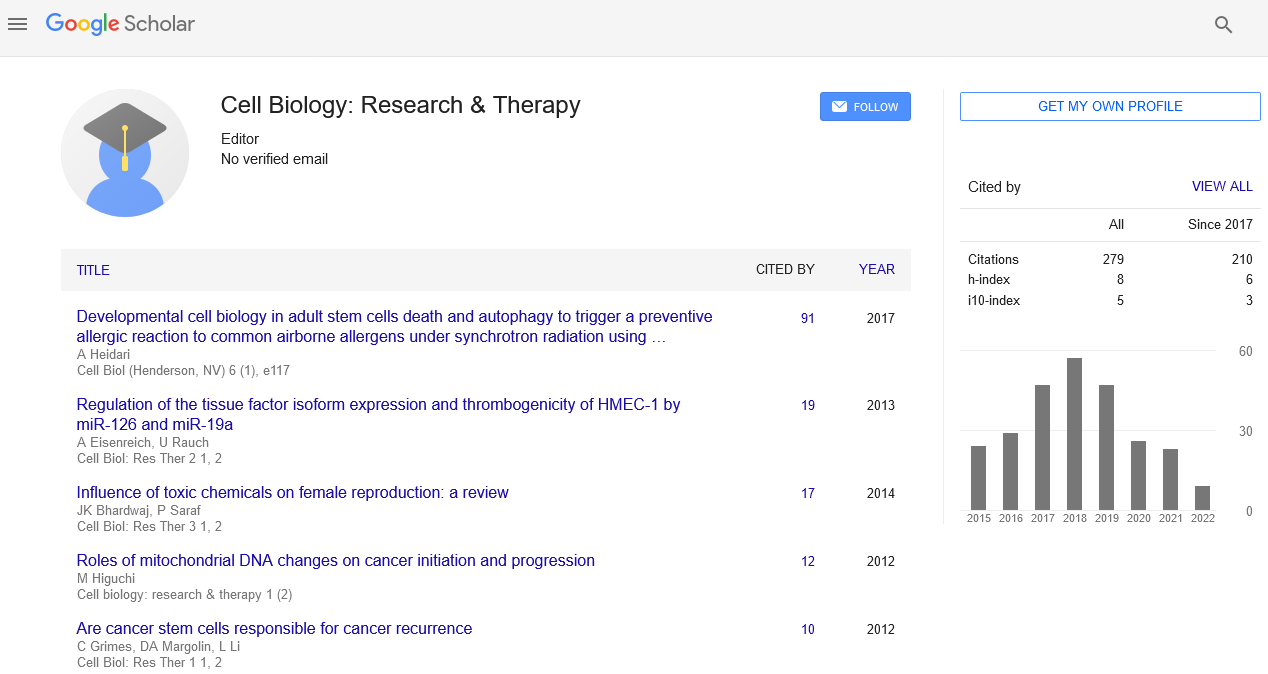Perspective, Cell Biol Vol: 12 Issue: 4
Cell Biology of Autoimmune Disorders: Unraveling Mechanisms for Targeted Therapy
Sebastian Davis*
1Department of Cell Biology, Institute for Cellular Therapies, Johns Hopkins University, Baltimore, USA
*Corresponding Author: Sebastian Davis,
Department of Cell Biology, Institute for
Cellular Therapies, Johns Hopkins University, Baltimore, USA
E-mail: davissebastain@gmail.com
Received date: 27 December, 2023, Manuscript No. CBRT-24-125275;
Editor assigned date: 29 December, 2023, Pre QC No. CBRT-24-125275 (PQ);
Reviewed date: 14 December, 2023, QC No. CBRT-24-125275;
Revised date: 21 December, 2023, Manuscript No. CBRT-24-125275 (R);
Published date: 29 December, 2023, DOI: 10.4172/2324-9293.1000191
Citation: Davis S (2023) Cell Biology of Autoimmune Disorders: Unraveling Mechanisms for Targeted Therapy. Cell Biol 12:4.
Description
Autoimmune disorders represent a complex group of diseases where the immune system, designed to protect the body from external threats, mistakenly targets and attacks its own cells and tissues. The cell biology of autoimmune disorders involves intricate molecular and cellular mechanisms that underlie the dysregulation of immune responses. Understanding these mechanisms is crucial for the development of targeted therapies aimed at modulating the immune system and restoring balance. This study delves into the cell biology of autoimmune disorders, highlighting key mechanisms and exploring the potential for targeted therapeutic interventions.
In autoimmune disorders, the immune system loses its ability to distinguish between self and non-self antigens, leading to the activation of immune responses against the body's own tissues. T lymphocytes, B lymphocytes, and other immune cells play pivotal roles in this dysregulation, resulting in chronic inflammation and tissue damage. The cell biology of autoimmune disorders often involves a genetic component. Certain genetic variations may predispose individuals to an increased risk of developing autoimmune conditions. Genome-Wide Association Studies (GWAS) have identified specific genetic markers associated with various autoimmune diseases, providing insights into susceptibility and potential targets for therapy.
B lymphocytes are central players in autoimmune disorders, producing autoantibodies that target self-antigens. These autoantibodies contribute to the formation of immune complexes, which can deposit in tissues and trigger inflammation. Understanding the cellular processes leading to autoantibody production is crucial for developing strategies to modulate B cell responses. T lymphocytes, particularly CD4+ T cells, are key contributors to autoimmune pathogenesis. Dysregulated T cell activation and differentiation lead to the release of pro-inflammatory cytokines and the recruitment of immune cells to target tissues. Targeting specific T cell subsets and their signaling pathways is a focus for therapeutic interventions.
Dendritic cells, as antigen-presenting cells, play a critical role in initiating immune responses. In autoimmune disorders, aberrant activation of dendritic cells leads to the presentation of self-antigens to T cells, triggering an autoimmune response. Targeting dendritic cell function represents a potential avenue for therapeutic intervention. Autoimmune disorders are characterized by an excess production of inflammatory mediators, including cytokines and chemokines. These molecules contribute to the recruitment and activation of immune cells, perpetuating inflammation and tissue damage. Therapeutic strategies aim to modulate the production and action of these inflammatory mediators.
Regulatory T cells play a crucial role in maintaining immune tolerance and preventing autoimmunity. Dysregulation of Treg function is often observed in autoimmune disorders, contributing to the breakdown of immune tolerance. Strategies to enhance Treg activity represent a potential therapeutic approach for restoring immune balance. Epigenetic modifications, including DNA methylation and histone acetylation, influence gene expression patterns in autoimmune disorders. Understanding the epigenetic regulation of immune cells provides insights into the molecular mechanisms underlying autoimmune pathogenesis. Epigenetic modulators are being explored as potential therapeutic agents.
Monoclonal antibodies targeting specific immune cells, cytokines, or their receptors have shown efficacy in modulating immune responses. Examples include anti-TNF agents and anti-B cell therapies, which aim to reduce inflammation and control autoimmune activity. JAK inhibitors interfere with intracellular signaling pathways involved in immune cell activation. By targeting Janus kinases, these drugs modulate cytokine signaling and have shown promise in treating autoimmune conditions such as rheumatoid arthritis and psoriasis.
Therapies targeting specific T cell subsets, such as CD4+ T cells, aim to control aberrant T cell activation. This includes strategies to inhibit T cell activation, block co-stimulatory signals, or induce T cell apoptosis selectively. Novel approaches are being explored to induce immune tolerance, teaching the immune system to recognize selfantigens as harmless. This includes the use of tolerogenic dendritic cells or antigen-specific immunotherapy to re-educate the immune system.
Conclusion
The cell biology of autoimmune disorders involves a complex interplay of immune cells, genetic factors, and molecular mechanisms. Targeted therapies that modulate specific components of the immune system hold great promise for treating autoimmune conditions by restoring immune balance. As our understanding of the intricate cellular and molecular pathways deepens, ongoing research endeavors aim to uncover novel therapeutic targets, paving the way for more effective and personalized treatments for individuals living with autoimmune disorders.
 Spanish
Spanish  Chinese
Chinese  Russian
Russian  German
German  French
French  Japanese
Japanese  Portuguese
Portuguese  Hindi
Hindi 